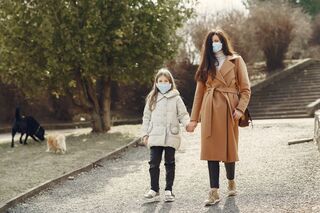Relationships
The Parent-Child Relationship a Year into the Pandemic
What has changed and what can parents do to provide support going forward?
Posted March 15, 2021 Reviewed by Lybi Ma
- Families report increased time together, with fewer extracurricular activities and distracting obligations; they have been able to slow down and avoid overscheduling.
- However, parents feel more stressed from job loss and overseeing their children’s education at home.
- Problems in parent-child relationships prior to the pandemic exacerbated mental health and behavior during the pandemic.
- See tips on how to improve and benefit parent-child relationships.
It has been a full year since schools and businesses started closing in initial COVID lockdowns. Parent-child relationships have changed a lot since then. A number of research studies have documented both positive and negative changes.
Families Are Spending More Quality Time Together
On the positive side, many children, mothers, and fathers are reporting increases in the amount of time they’re spending doing fun things together. Some families also have reported that with fewer extracurricular activities and other obligations, they have been able to slow down and avoid rushing from place to place and activity to activity that sometimes characterized pre-pandemic life. Some of these are changes that parents and children say they want to continue even after the pandemic ends.

The Pandemic Also Created More Stress
On the negative side, an increase in pandemic-related stress is related to an increase in parents’ harshness toward their children. Many of parents’ stressors, such as job loss and the responsibility of overseeing children’s education at home, were directly caused by the pandemic. A daily diary study has shown that on any given day during the pandemic, 25 percent of parents reported that children’s schooling or child care arrangements did not go as expected that day. Stress, in turn, makes it more difficult to provide calm, consistent parenting; this contributes to strain in parent-child relationships. At an extreme, concerns about child abuse and neglect have increased during the pandemic.
The Pandemic Exacerbated Prior Relationship Difficulties
Research studies that collected data before the pandemic and again during the pandemic found that problems in parent-child relationships prior to the pandemic exacerbated mental health and behavior problems during the pandemic. In contrast, supportive parent-child relationships prior to the pandemic served as protective buffers for both parents and children during the pandemic. Thus, what has happened in parent-child relationships in the last year is not isolated from what characterized particular parent-child relationships prior to the pandemic. What do these positive and negative changes mean for parent-child relationships going forward?
Here Are Some Ways to Improve and Benefit the Parent-Child Relationship
- Continue to find ways to spend time enjoying each other’s company. Let children choose activities for the whole family to do together.
- Recognize that children, and especially adolescents, also need their own space and time alone.
- Keep trying to provide routines as much as possible. Routines can make life feel more predictable and, therefore, less stressful.
- Parents should cut children, and themselves, some slack. Children and adults alike are struggling emotionally. Ease up on expectations and make time for fun and relaxation.
- Communicate as openly as possible. Ask children how they’re doing and really listen to their answers. Be non-judgmental in responding to children so they will be willing to disclose what’s happening in their lives.
- Conflict is inevitable in parent-child relationships, but be careful to make this conflict respectful, and try to resolve it in a way that reduces anger and avoids aggression.
- Show children how much their contributions to the family are valued and acknowledge how hard the last year has been.
The pandemic has been pervasive in affecting all members of a family. This pervasiveness poses a challenge because parents and children alike have experienced prolonged disruptions in daily life and accompanying increases in stress, which has taken a toll on mental health. But, by going through this stress together, parents and children also have the ability to identify with one another through a shared experience. In what will hopefully be the final stretch of the pandemic, parent-child relationships characterized by ongoing support have the potential to set the stage for resilience following the pandemic.


